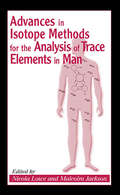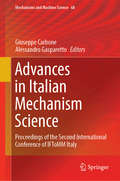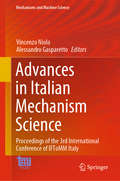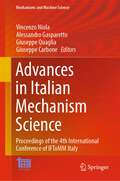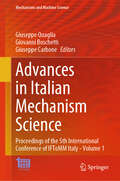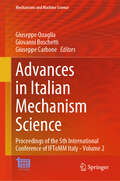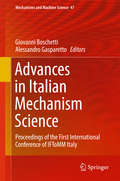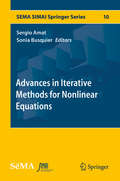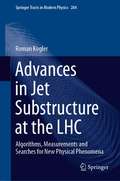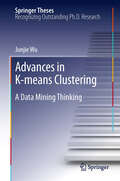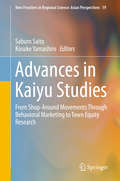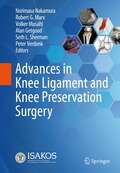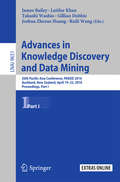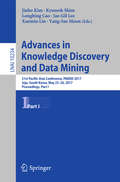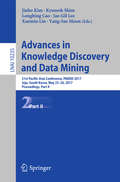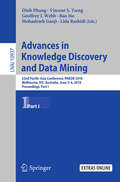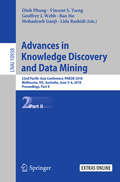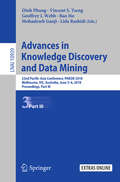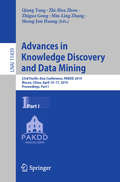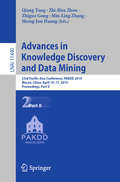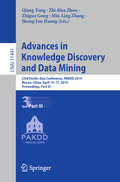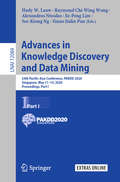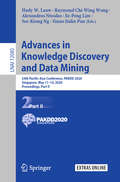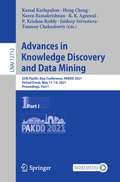- Table View
- List View
Advances in Irrigation Agronomy
by M.K.V. CarrIrrigation has been used for thousands of years to maximize the performance, efficiency and profitability of crops and it is a science that is constantly evolving. This potential for improved crop yields has never been more important as population levels and demand for food continue to grow. Recognising the need for a coherent and accessible review of international irrigation research, this book examines the factors influencing water productivity in individual crops. It focuses on nine key plantation/industrial crops on which millions of people in the tropics and subtropics depend for their livelihoods (banana, cocoa, coconut, coffee, oil palm, rubber, sisal, sugar cane and tea). Linking crop physiology, agronomy and irrigation practices, this is a valuable resource for planners, irrigation engineers, agronomists and producers concerned with the international need to improve water productivity in agriculture in the face of increased pressure on water resources.
Advances in Isotope Methods for the Analysis of Trace Elements in Man (Modern Nutrition)
by Nicola Lowe Malcolm JacksonThere is increasing evidence that even minute amounts of trace elements can have profound effects on the human body. Advances in Isotope Methods for the Analysis of Trace Elements in Man describes new methods that are being developed to understand normal and abnormal trace element nutrition and metabolism. This book includes a wealth of pr
Advances in Italian Mechanism Science: Proceedings Of The First International Conference Of Iftomm Italy (Mechanisms and Machine Science #47)
by Giuseppe Carbone Alessandro GasparettoThis book constitutes the Proceedings of the Second International Conference of IFToMM ITALY, held in Cassino, Italy, in 2018. The main topics of the workshop include: Computational Kinematics, Dynamics of Machinery, Gearing and Transmissions, Multibody Dynamics, Mechatronics, Mechanism Design, Tribology, Vibration, Industrial and non-Industrial Applications.
Advances in Italian Mechanism Science: Proceedings of the 3rd International Conference of IFToMM Italy (Mechanisms and Machine Science #91)
by Alessandro Gasparetto Vincenzo NiolaThis book presents the proceedings of the 3rd International Conference of IFToMM ITALY, held online on September 9-11, 2020. It includes peer-reviewed papers on the latest advances in mechanism and machine science, discussing topics such as biomechanical engineering, computational kinematics, the history of mechanism and machine science, gearing and transmissions, multi-body dynamics, robotics and mechatronics, the dynamics of machinery, tribology, vibrations, rotor dynamics and vehicle dynamics. A valuable, up-to-date resource, it offers an essential overview of the subject for scientists and practitioners alike, and will inspire further investigations and research.
Advances in Italian Mechanism Science: Proceedings of the 4th International Conference of IFToMM Italy (Mechanisms and Machine Science #122)
by Giuseppe Carbone Alessandro Gasparetto Giuseppe Quaglia Vincenzo NiolaThis book presents the proceedings of the 4th International Conference of IFToMM ITALY (IFIT), held in Naples, Italy on September 7-9, 2022. It includes peer-reviewed papers on the latest advances in mechanism and machine science, discussing topics such as biomechanical engineering, computational kinematics, the history of mechanism and machine science, gearing and transmissions, multi-body dynamics, robotics and mechatronics, the dynamics of machinery, tribology, vibrations, rotor dynamics and vehicle dynamics. A valuable, up-to-date resource, it offers an essential overview of the subject for scientists and practitioners alike, and will inspire further investigations and research.
Advances in Italian Mechanism Science: Proceedings of the 5th International Conference of IFToMM Italy - Volume 1 (Mechanisms and Machine Science #163)
by Giuseppe Carbone Giovanni Boschetti Giuseppe QuagliaThis book presents the proceedings of the 5th International Conference of IFToMM ITALY (IFIT), held in Turin, Italy on September 11–13, 2024. It includes peer-reviewed papers on the latest advances in mechanism and machine science, discussing topics such as biomechanical engineering, computational kinematics, the history of mechanism and machine science, gearing and transmissions, multi-body dynamics, robotics and mechatronics, the dynamics of machinery, tribology, vibrations, rotor dynamics and vehicle dynamics. A valuable, up-to-date resource, it offers an essential overview of the subject for scientists and practitioners alike and inspires further investigations and research.
Advances in Italian Mechanism Science: Proceedings of the 5th International Conference of IFToMM Italy - Volume 2 (Mechanisms and Machine Science #164)
by Giuseppe Carbone Giovanni Boschetti Giuseppe QuagliaThis book presents the proceedings of the 5th International Conference of IFToMM ITALY (IFIT), held in Turin, Italy on September 11–13, 2024. It includes peer-reviewed papers on the latest advances in mechanism and machine science, discussing topics such as biomechanical engineering, computational kinematics, the history of mechanism and machine science, gearing and transmissions, multi-body dynamics, robotics and mechatronics, the dynamics of machinery, tribology, vibrations, rotor dynamics and vehicle dynamics. A valuable, up-to-date resource, it offers an essential overview of the subject for scientists and practitioners alike and inspires further investigations and research.
Advances in Italian Mechanism Science: Proceedings of the First International Conference of IFToMM Italy (Mechanisms and Machine Science #47)
by Giovanni Boschetti Alessandro GasparettoThis volume contains the Proceedings of the First International Conference of IFToMM Italy (IFIT2016), held at the University of Padova, Vicenza, Italy, on December 1-2, 2016. The book contains contributions on the latest advances on Mechanism and Machine Science. The fifty-nine papers deal with such topics as biomechanical engineering, history of mechanism and machine science, linkages and mechanical controls, multy-body dynamics, reliability, robotics and mechatronics, transportation machinery, tribology, and vibrations.
Advances in Iterative Methods for Nonlinear Equations (SEMA SIMAI Springer Series #10)
by Sergio Amat Sonia BusquierThis book focuses on the approximation of nonlinear equations using iterative methods. Nine contributions are presented on the construction and analysis of these methods, the coverage encompassing convergence, efficiency, robustness, dynamics, and applications. Many problems are stated in the form of nonlinear equations, using mathematical modeling. In particular, a wide range of problems in Applied Mathematics and in Engineering can be solved by finding the solutions to these equations. The book reveals the importance of studying convergence aspects in iterative methods and shows that selection of the most efficient and robust iterative method for a given problem is crucial to guaranteeing a good approximation. A number of sample criteria for selecting the optimal method are presented, including those regarding the order of convergence, the computational cost, and the stability, including the dynamics. This book will appeal to researchers whose field of interest is related to nonlinear problems and equations, and their approximation.
Advances in Jet Substructure at the LHC: Algorithms, Measurements and Searches for New Physical Phenomena (Springer Tracts in Modern Physics #284)
by Roman KoglerThis book introduces the reader to the field of jet substructure, starting from the basic considerations for capturing decays of boosted particles in individual jets, to explaining state-of-the-art techniques. Jet substructure methods have become ubiquitous in data analyses at the LHC, with diverse applications stemming from the abundance of jets in proton-proton collisions, the presence of pileup and multiple interactions, and the need to reconstruct and identify decays of highly-Lorentz boosted particles. The last decade has seen a vast increase in our knowledge of all aspects of the field, with a proliferation of new jet substructure algorithms, calculations and measurements which are presented in this book. Recent developments and algorithms are described and put into the larger experimental context. Their usefulness and application are shown in many demonstrative examples and the phenomenological and experimental effects influencing their performance are discussed. A comprehensive overview is given of measurements and searches for new phenomena performed by the ATLAS and CMS Collaborations. This book shows the impressive versatility of jet substructure methods at the LHC.
Advances in K-means Clustering: A Data Mining Thinking (Springer Theses)
by Junjie WuNearly everyone knows K-means algorithm in the fields of data mining and business intelligence. But the ever-emerging data with extremely complicated characteristics bring new challenges to this "old" algorithm. This book addresses these challenges and makes novel contributions in establishing theoretical frameworks for K-means distances and K-means based consensus clustering, identifying the "dangerous" uniform effect and zero-value dilemma of K-means, adapting right measures for cluster validity, and integrating K-means with SVMs for rare class analysis. This book not only enriches the clustering and optimization theories, but also provides good guidance for the practical use of K-means, especially for important tasks such as network intrusion detection and credit fraud prediction. The thesis on which this book is based has won the "2010 National Excellent Doctoral Dissertation Award", the highest honor for not more than 100 PhD theses per year in China.
Advances in Kaiyu Studies: From Shop-Around Movements Through Behavioral Marketing to Town Equity Research (New Frontiers in Regional Science: Asian Perspectives #19)
by Saburo Saito Kosuke YamashiroThis book is the first systematic exposition of advances in Kaiyu studies carried out by the author and his colleagues in Japan and other parts of Asia. Consumer shop-around behavior is referred to as Kaiyu in Japanese, a term widely used in several fields such as city planning, marketing, real estate, tourism, and regional policy. The book demonstrates how Kaiyu research has evolved from the original idea to the present state and envisages prospective Kaiyu studies in the age of big data and the Internet of Things (IoT). The distinguishing feature of their research is that Kaiyu is regarded as consumers’ simultaneous decisions sequentially made while undertaking their shop-arounds as to which shops they visit, for what purpose, and how much they spend there. This is a sharp contrast to much research on trip chains, which only deal with spatial movements. As a result, their studies first succeeded in empirically exploring the relationships between consumer shop-around movements and money flows among shopping sites within a city center retail environment. As a result, the author and his coworkers uncovered the roles of many urban policies and facilities inexplicit so far by revealing how they contribute to the turnover of the whole town through stimulating Kaiyu. This gives a universal means of evaluation for urban development policy. Thus they have refreshed the scope of consumer shop-around studies from shop-around movements in the context of city planning, shopping marketing, and evaluation of urban revitalization policy, to town equity researches. This book presents step by step these conceptual developments by showing concrete research examples from their vast Kaiyu studies based on numerous empirical interview surveys at real retail environments.
Advances in Knee Ligament and Knee Preservation Surgery
by Robert G. Marx Norimasa Nakamura Volker Musahl Alan Getgood Peter Verdonk Seth L. ShermanThis comprehensive book offers an overview of the latest advances in knee ligament and knee preservation surgery, including cartilage, meniscus, and osteotomy procedures.Designed to offer practical guidance on the management of complex knee problems, it presents clinical scenarios as well as recommendations by leading international experts. Written in collaboration with ISAKOS and drawing on a variety of perspectives it is invaluable tool for orthopedic and sports medicine surgeons.
Advances in Knowledge Discovery and Data Mining: 20th Pacific-Asia Conference, PAKDD 2016, Auckland, New Zealand, April 19-22, 2016, Proceedings, Part I (Lecture Notes in Computer Science #9651)
by James Bailey Ruili Wang Latifur Khan Takashi Washio Gill Dobbie Joshua Zhexue HuangThis two-volume set, LNAI 9651 and 9652, constitutes thethoroughly refereed proceedings of the 20th Pacific-Asia Conference on Advancesin Knowledge Discovery and Data Mining, PAKDD 2016, held in Auckland, NewZealand, in April 2016. The 91 full papers were carefully reviewed andselected from 307 submissions. They are organized in topical sections named:classification; machine learning; applications; novel methods and algorithms;opinion mining and sentiment analysis; clustering; feature extraction andpattern mining; graph and network data; spatiotemporal and image data; anomalydetection and clustering; novel models and algorithms; and text mining andrecommender systems.
Advances in Knowledge Discovery and Data Mining: 21st Pacific-Asia Conference, PAKDD 2017, Jeju, South Korea, May 23-26, 2017, Proceedings, Part I (Lecture Notes in Computer Science #10234)
by Jinho Kim, Kyuseok Shim, Longbing Cao, Jae-Gil Lee, Xuemin Lin and Yang-Sae MoonThis two-volume set, LNAI 10234 and 10235, constitutes the thoroughly refereed proceedings of the 21st Pacific-Asia Conference on Advances in Knowledge Discovery and Data Mining, PAKDD 2017, held in Jeju, South Korea, in May 2017. The 129 full papers were carefully reviewed and selected from 458 submissions. They are organized in topical sections named: classification and deep learning; social network and graph mining; privacy-preserving mining and security/risk applications; spatio-temporal and sequential data mining; clustering and anomaly detection; recommender system; feature selection; text and opinion mining; clustering and matrix factorization; dynamic, stream data mining; novel models and algorithms; behavioral data mining; graph clustering and community detection; dimensionality reduction.
Advances in Knowledge Discovery and Data Mining: 21st Pacific-Asia Conference, PAKDD 2017, Jeju, South Korea, May 23-26, 2017, Proceedings, Part II (Lecture Notes in Computer Science #10235)
by Jinho Kim, Kyuseok Shim, Longbing Cao, Jae-Gil Lee, Xuemin Lin and Yang-Sae MoonThis two-volume set, LNAI 10234 and 10235, constitutes the thoroughly refereed proceedings of the 21st Pacific-Asia Conference on Advances in Knowledge Discovery and Data Mining, PAKDD 2017, held in Jeju, South Korea, in May 2017. The 129 full papers were carefully reviewed and selected from 458 submissions. They are organized in topical sections named: classification and deep learning; social network and graph mining; privacy-preserving mining and security/risk applications; spatio-temporal and sequential data mining; clustering and anomaly detection; recommender system; feature selection; text and opinion mining; clustering and matrix factorization; dynamic, stream data mining; novel models and algorithms; behavioral data mining; graph clustering and community detection; dimensionality reduction.
Advances in Knowledge Discovery and Data Mining: 22nd Pacific-Asia Conference, PAKDD 2018, Melbourne, VIC, Australia, June 3-6, 2018, Proceedings, Part I (Lecture Notes in Computer Science #10937)
by Geoffrey I. Webb Vincent S. Tseng Dinh Phung Bao Ho Mohadeseh Ganji Lida RashidiThis three-volume set, LNAI 10937, 10938, and 10939, constitutes the thoroughly refereed proceedings of the 22nd Pacific-Asia Conference on Advances in Knowledge Discovery and Data Mining, PAKDD 2018, held in Melbourne, VIC, Australia, in June 2018. The 164 full papers were carefully reviewed and selected from 592 submissions. The volumes present papers focusing on new ideas, original research results and practical development experiences from all KDD related areas, including data mining, data warehousing, machine learning, artificial intelligence, databases, statistics, knowledge engineering, visualization, decision-making systems and the emerging applications.
Advances in Knowledge Discovery and Data Mining: 22nd Pacific-Asia Conference, PAKDD 2018, Melbourne, VIC, Australia, June 3-6, 2018, Proceedings, Part II (Lecture Notes in Computer Science #10938)
by Geoffrey I. Webb Vincent S. Tseng Dinh Phung Bao Ho Mohadeseh Ganji Lida RashidiThis three-volume set, LNAI 10937, 10938, and 10939, constitutes the thoroughly refereed proceedings of the 22nd Pacific-Asia Conference on Advances in Knowledge Discovery and Data Mining, PAKDD 2018, held in Melbourne, VIC, Australia, in June 2018. The 164 full papers were carefully reviewed and selected from 592 submissions. The volumes present papers focusing on new ideas, original research results and practical development experiences from all KDD related areas, including data mining, data warehousing, machine learning, artificial intelligence, databases, statistics, knowledge engineering, visualization, decision-making systems and the emerging applications.
Advances in Knowledge Discovery and Data Mining: 22nd Pacific-Asia Conference, PAKDD 2018, Melbourne, VIC, Australia, June 3-6, 2018, Proceedings, Part III (Lecture Notes in Computer Science #10939)
by Geoffrey I. Webb Vincent S. Tseng Dinh Phung Bao Ho Mohadeseh Ganji Lida RashidiThis three-volume set, LNAI 10937, 10938, and 10939, constitutes the thoroughly refereed proceedings of the 22nd Pacific-Asia Conference on Advances in Knowledge Discovery and Data Mining, PAKDD 2018, held in Melbourne, VIC, Australia, in June 2018. The 164 full papers were carefully reviewed and selected from 592 submissions. The volumes present papers focusing on new ideas, original research results and practical development experiences from all KDD related areas, including data mining, data warehousing, machine learning, artificial intelligence, databases, statistics, knowledge engineering, visualization, decision-making systems and the emerging applications.
Advances in Knowledge Discovery and Data Mining: 23rd Pacific-Asia Conference, PAKDD 2019, Macau, China, April 14-17, 2019, Proceedings, Part I (Lecture Notes in Computer Science #11439)
by Zhi-Hua Zhou Zhiguo Gong Min-Ling Zhang Qiang Yang Sheng-Jun HuangThe three-volume set LNAI 11439, 11440, and 11441 constitutes the thoroughly refereed proceedings of the 23rd Pacific-Asia Conference on Knowledge Discovery and Data Mining, PAKDD 2019, held in Macau, China, in April 2019. The 137 full papers presented were carefully reviewed and selected from 542 submissions. The papers present new ideas, original research results, and practical development experiences from all KDD related areas, including data mining, data warehousing, machine learning, artificial intelligence, databases, statistics, knowledge engineering, visualization, decision-making systems, and the emerging applications. They are organized in the following topical sections: classification and supervised learning; text and opinion mining; spatio-temporal and stream data mining; factor and tensor analysis; healthcare, bioinformatics and related topics; clustering and anomaly detection; deep learning models and applications; sequential pattern mining; weakly supervised learning; recommender system; social network and graph mining; data pre-processing and feature selection; representation learning and embedding; mining unstructured and semi-structured data; behavioral data mining; visual data mining; and knowledge graph and interpretable data mining.
Advances in Knowledge Discovery and Data Mining: 23rd Pacific-Asia Conference, PAKDD 2019, Macau, China, April 14-17, 2019, Proceedings, Part II (Lecture Notes in Computer Science #11440)
by Zhi-Hua Zhou Zhiguo Gong Min-Ling Zhang Qiang Yang Sheng-Jun HuangThe three-volume set LNAI 11439, 11440, and 11441 constitutes the thoroughly refereed proceedings of the 23rd Pacific-Asia Conference on Knowledge Discovery and Data Mining, PAKDD 2019, held in Macau, China, in April 2019. The 137 full papers presented were carefully reviewed and selected from 542 submissions. The papers present new ideas, original research results, and practical development experiences from all KDD related areas, including data mining, data warehousing, machine learning, artificial intelligence, databases, statistics, knowledge engineering, visualization, decision-making systems, and the emerging applications. They are organized in the following topical sections: classification and supervised learning; text and opinion mining; spatio-temporal and stream data mining; factor and tensor analysis; healthcare, bioinformatics and related topics; clustering and anomaly detection; deep learning models and applications; sequential pattern mining; weakly supervised learning; recommender system; social network and graph mining; data pre-processing and featureselection; representation learning and embedding; mining unstructured and semi-structured data; behavioral data mining; visual data mining; and knowledge graph and interpretable data mining.
Advances in Knowledge Discovery and Data Mining: 23rd Pacific-Asia Conference, PAKDD 2019, Macau, China, April 14-17, 2019, Proceedings, Part III (Lecture Notes in Computer Science #11441)
by Zhi-Hua Zhou Zhiguo Gong Min-Ling Zhang Qiang Yang Sheng-Jun HuangThe three-volume set LNAI 11439, 11440, and 11441 constitutes the thoroughly refereed proceedings of the 23rd Pacific-Asia Conference on Knowledge Discovery and Data Mining, PAKDD 2019, held in Macau, China, in April 2019. The 137 full papers presented were carefully reviewed and selected from 542 submissions. The papers present new ideas, original research results, and practical development experiences from all KDD related areas, including data mining, data warehousing, machine learning, artificial intelligence, databases, statistics, knowledge engineering, visualization, decision-making systems, and the emerging applications. They are organized in the following topical sections: classification and supervised learning; text and opinion mining; spatio-temporal and stream data mining; factor and tensor analysis; healthcare, bioinformatics and related topics; clustering and anomaly detection; deep learning models and applications; sequential pattern mining; weakly supervised learning; recommender system; social network and graph mining; data pre-processing and featureselection; representation learning and embedding; mining unstructured and semi-structured data; behavioral data mining; visual data mining; and knowledge graph and interpretable data mining.
Advances in Knowledge Discovery and Data Mining: 24th Pacific-Asia Conference, PAKDD 2020, Singapore, May 11–14, 2020, Proceedings, Part I (Lecture Notes in Computer Science #12084)
by Ee-Peng Lim Raymond Chi-Wing Wong See-Kiong Ng Hady W. Lauw Alexandros Ntoulas Sinno Jialin PanThe two-volume set LNAI 12084 and 12085 constitutes the thoroughly refereed proceedings of the 24th Pacific-Asia Conference on Knowledge Discovery and Data Mining, PAKDD 2020, which was due to be held in Singapore, in May 2020. The conference was held virtually due to the COVID-19 pandemic. The 135 full papers presented were carefully reviewed and selected from 628 submissions. The papers present new ideas, original research results, and practical development experiences from all KDD related areas, including data mining, data warehousing, machine learning, artificial intelligence, databases, statistics, knowledge engineering, visualization, decision-making systems, and the emerging applications. They are organized in the following topical sections: recommender systems; classification; clustering; mining social networks; representation learning and embedding; mining behavioral data; deep learning; feature extraction and selection; human, domain, organizational and social factors in data mining; mining sequential data; mining imbalanced data; association; privacy and security; supervised learning; novel algorithms; mining multi-media/multi-dimensional data; application; mining graph and network data; anomaly detection and analytics; mining spatial, temporal, unstructured and semi-structured data; sentiment analysis; statistical/graphical model; multi-source/distributed/parallel/cloud computing.
Advances in Knowledge Discovery and Data Mining: 24th Pacific-Asia Conference, PAKDD 2020, Singapore, May 11–14, 2020, Proceedings, Part II (Lecture Notes in Computer Science #12085)
by Ee-Peng Lim Raymond Chi-Wing Wong See-Kiong Ng Hady W. Lauw Alexandros Ntoulas Sinno Jialin PanThe two-volume set LNAI 12084 and 12085 constitutes the thoroughly refereed proceedings of the 24th Pacific-Asia Conference on Knowledge Discovery and Data Mining, PAKDD 2020, held in Singapore, in May 2020. The 135 full papers presented were carefully reviewed and selected from 628 submissions. The papers present new ideas, original research results, and practical development experiences from all KDD related areas, including data mining, data warehousing, machine learning, artificial intelligence, databases, statistics, knowledge engineering, visualization, decision-making systems, and the emerging applications. They are organized in the following topical sections: recommender systems; classification; clustering; mining social networks; representation learning and embedding; mining behavioral data; deep learning; feature extraction and selection; human, domain, organizational and social factors in data mining; mining sequential data; mining imbalanced data; association; privacy and security; supervised learning; novel algorithms; mining multi-media/multi-dimensional data; application; mining graph and network data; anomaly detection and analytics; mining spatial, temporal, unstructured and semi-structured data; sentiment analysis; statistical/graphical model; multi-source/distributed/parallel/cloud computing.
Advances in Knowledge Discovery and Data Mining: 25th Pacific-Asia Conference, PAKDD 2021, Virtual Event, May 11–14, 2021, Proceedings, Part I (Lecture Notes in Computer Science #12712)
by Hong Cheng Jaideep Srivastava P. Krishna Reddy Tanmoy Chakraborty Naren Ramakrishnan Kamal Karlapalem R. K. AgrawalThe 3-volume set LNAI 12712-12714 constitutes the proceedings of the 25th Pacific-Asia Conference on Advances in Knowledge Discovery and Data Mining, PAKDD 2021, which was held during May 11-14, 2021.The 157 papers included in the proceedings were carefully reviewed and selected from a total of 628 submissions. They were organized in topical sections as follows: Part I: Applications of knowledge discovery and data mining of specialized data; Part II: Classical data mining; data mining theory and principles; recommender systems; and text analytics; Part III: Representation learning and embedding, and learning from data.

